By Eric Vandenbroeck and co-workers
The Fight For A New Israel
In late July 2024,
Israel experienced one of the biggest shocks to law and order. For several hours,
dozens of Israeli protesters were able to infiltrate two military compounds
largely unimpeded, starting with Sde Teiman, a
recently established base in the Negev desert where thousands of Palestinian
detainees have been held since Hamas’s October 7, 2023, attack. For months,
journalists and nongovernmental organizations had reported systematic abuses at
the base. On July 29, Israel’s military police detained ten Israeli reservists
on suspicion of raping one of the prisoners. But the protesters, among them
several far-right elected officials who are members of Prime Minister Benjamin
Netanyahu’s ruling coalition, were not decrying the mistreatment of
Palestinians. They were furious that the military was taking such a step
against its own and were trying to block the arrests.
Although the riots at
Sde Teiman and Beit Lid, the base where the suspects
were taken, were unusual in their extremity, they were not isolated events.
Since the war in Gaza began, there
have been proliferating signs that Israel’s institutions of state are under
severe stress. Netanyahu has ignored repeated warnings from Israel’s attorney
general that his government’s actions have violated the law; in response,
government ministers have called for the attorney general’s dismissal. Israel’s
legal system is in disarray. For over a year, the government held up dozens of
judicial appointments, including on Israel’s Supreme Court; and in September,
Netanyahu’s justice minister escalated his efforts to stymie the appointment of
a chief justice to the Supreme Court, even defying a court order requiring that
the position be filled.
Israeli law
enforcement has become highly erratic. The murder rate among Israel’s Arab
community has more than doubled under the current government, largely because
of organized crime, yet in 2023, only 17 percent of such murders were solved.
Even worse is the situation in the West Bank: despite soaring attacks by
settlers against Palestinians, the state is now detaining only a quarter of the
number of Jewish suspects it did in 2022. The Israeli military—which is
responsible for enforcing the law in occupied territories—has ignored or even
participated in the violence.
At first glance, this
accelerating lawlessness, including from Israel’s government, may appear to
reflect the extraordinary pressures of a country mired in the longest and most
challenging war since the War of Independence. As of late September, Israel was
not only continuing its year-old, devastating war against Hamas in Gaza amid dimming prospects for more than one
hundred Israeli hostages still held there. It was also embarking on a
precipitous escalation with Hezbollah in Lebanon, even as it confronted growing
threats from the Houthis in Yemen, militants in the West Bank, Iranian-backed
Iraqi militias, and Iran itself.
But the assault on
Israel’s institutions began long before October 7, 2023. At the time of Hamas’s
attack, Israel had been racked for
months by a huge protest movement that aimed to stop the Netanyahu government’s
sweeping effort to weaken judicial independence. This plan was crafted to allow
the ruling coalition to fill the courts and other key civil offices with ideologically
aligned justices and political loyalists. Along with consolidating its own
power, the government was seeking to institutionalize higher status for Jewish
citizens and strengthen the influence of Jewish religion in public and private
life. But perhaps above all, the reforms were designed to give the government
unfettered power to extend sovereignty—a euphemism for annexation—over the West
Bank, a longtime goal of Israel’s far right.
A Palestinian woman inspecting a vehicle destroyed by
Israeli settlers, near Qalqilya in the West Bank, August 2024
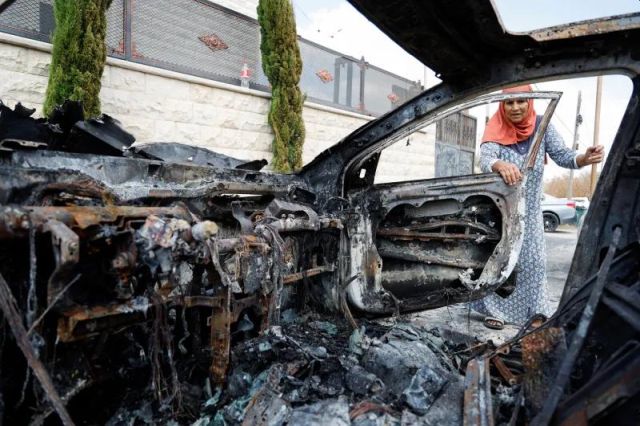
When Israelis began
protesting the judicial overhaul in January 2023, they were stunned by the
government’s extreme plans and blatant power grab. But they were at least as
shocked to realize that Israel’s institutional checks and balances were so
vulnerable, or even absent, a problem that stems directly from the country’s
incomplete democratic foundations. Foremost is the lack of a constitution.
Despite repeated attempts since the country’s founding, Israel has consistently
failed to adopt a formal constitution that defines the balance of powers and a
complete bill of rights that guarantees fundamental human rights, civil
liberties, and the equality of all citizens. Instead, it has relied on
piecemeal legislation, court rulings, and ad hoc arrangements that have evolved
through custom or committee. The country has only the most tenuous human rights
legislation, anchored in hotly contested laws passed in the early 1990s. As
recently as 2018, a controversial law gave Jews alone the right to
self-determination in Israel. Unlike with almost any other democracy in the
world, many of the country’s borders are not concretely defined. Israel also
maintains control over millions of Palestinians who have few basic rights.
For decades, various
Israeli lawmakers—along with generations of legal scholars—have recognized the
core defects in Israel’s democratic foundations and have sought to address them
through a constitutional process. It has also long been acknowledged that Israel
faces a growing crisis of legitimacy as a result of its occupation of
Palestinian lands and control of a large population of noncitizens, policies
that the International Court of Justice has ruled illegal. Today, the problem
is intensified by the devastating human cost of Israel’s war in Gaza. Yet even
now, Israelis tend to treat these two issues—the country’s lack of
constitutional order and its ongoing military occupation of Palestinian people
and territories—as wholly separate phenomena. In reality, they are inseparable:
it is Israel’s weak or missing democratic foundations that have enabled
successive Israeli administrations to pursue and continually expand the
occupation.
Throughout a terrible
year of war, many observers have urged Israel to make clear its endpoint for
the conflict and how Palestinians will be able to govern themselves in the
future. If Israel wants to avoid a long-term reoccupation of Gaza and
perpetual violence in the West Bank, it will need a comprehensive strategy for
unified Palestinian self-governance in both territories, ideally statehood. But
lost in this discussion is what will be required of Israel’s own political
culture and institutions to ensure lasting peace. Israel must work toward its
own “day after,” and that day will never arrive unless the country addresses
the constitutional vacuum at its core.
Absent At The Creation
Israel’s founders did
not originally intend for the country to have no constitution. In November
1947, UN General Assembly Resolution 181, known as the partition plan, required
the future Jewish and Arab states to adopt strong democratic constitutions, and
Zionist leaders began crafting one. Early drafts show that the founders were
intimately aware of the elements necessary to make the country a full
democracy, including establishing the equality of all citizens, formulating a
bill of rights, and setting down a clear constitutional order defining the
powers of the branches of government.
But following the
declaration of independence, in May 1948, Israel’s first prime minister, David
Ben-Gurion, came to oppose the idea. Among various considerations, he worried
about limiting his party’s powers in government and alienating religious parties
who rejected secular civic principles. He also may have been concerned about
offering equal rights to all Arabs who remained after independence, since he
viewed them as a potential threat to Israeli security and an obstacle to
building a state for the Jewish population, including through the dispossession
of Arab land and property. Whatever the reason, the failure to adopt a
constitution meant that Israel lacked binding legal foundations for core
components of democratic statehood.
Israeli police clashing with ultra-Orthodox protesters
at a military recruitment center in Ramat Gan, Israel, August 2024
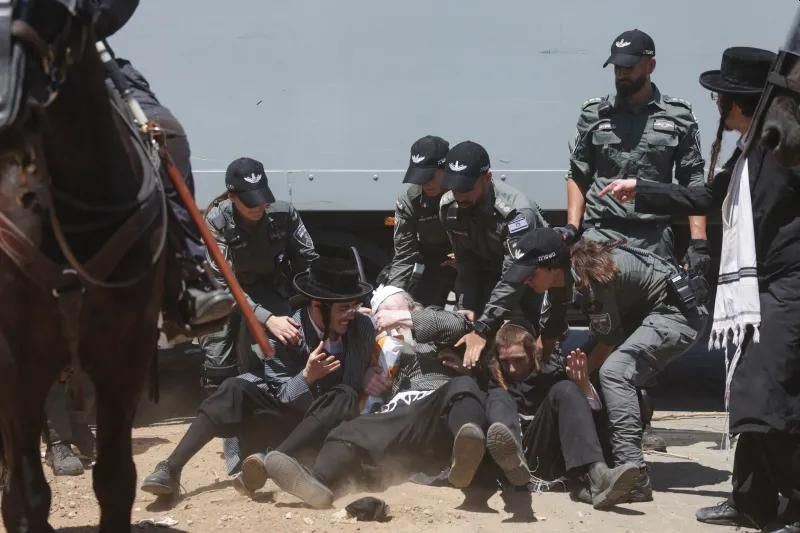
For one thing, apart
from its border with Egypt, established in the 1978 Camp David accords, Israel has
never defined the limits of its sovereign territory. (Although Israel
established borders with Jordan in 1994, they do not determine the status of
the West Bank.) As a result, it is often unclear where Israeli laws do or do
not apply. During the war of independence, the new state conquered territories
that extended well beyond those allotted to it in the UN partition plan;
Israel’s sovereignty in these areas was eventually recognized by
internationally brokered armistice agreements in 1949. But any division of the
former British mandate of Palestine was complicated by Palestinian and Arab
opposition to a Jewish state at all, as well as the Zionist vision of a Jewish
state that would cover the entire land. The 1949 armistice lines, also known as
the Green Line, were never formalized into Israeli law.
Following Israel’s
sweeping victory in the 1967 war—the Israeli army defeated Egypt, Jordan, and
Syria and occupied the West Bank along with East Jerusalem, Gaza, the Sinai
Peninsula, and the Golan Heights—the lack of a finite eastern border provided
fuel to those who hoped to incorporate these conquests. In the wake of that
war, Israel also showed a proclivity for expansionism, annexing East Jerusalem
and eventually the Golan Heights, and allowing the settlement movement to
spread throughout all occupied lands. (Israel eventually returned the Sinai to
Egypt, and dismantled settlements there, as it did later in Gaza.)
Israel was also slow
to define its body politic. At the time of Israeli independence, some 750,000
indigenous Arab Palestinians had been expelled or had fled from areas that
became part of the new state. But about 150,000 remained, making up some 15
percent of Israel’s population. In the absence of a constitution, a bill of
rights, or even a formal citizenship law, this group had ambiguous status, and
the Israeli government developed contradictory approaches to it. For example,
the new state adopted a then progressive policy of universal suffrage,
including for Palestinians in Israel. But it also placed most of their
communities under direct military rule, which was enforced through colonial
emergency regulations rather than through Israeli law. That approach lasted
virtually until the 1967 war, after which Arab Israelis fell under civilian
law. But at that point, the state once again established a military regime over
nearly a million Palestinians in newly conquered territories, creating, under
the pretext of temporary occupation, a huge category of noncitizen subjects.
Over time, Israeli control over this population became increasingly entrenched,
mitigated only marginally by the limited local autonomy established in the 1993
Oslo accords.
From the outset,
Israel’s leaders sought to ensure that the country maintained a clear Jewish
majority. Thus, the government declined to enact a citizenship law until it had
safeguarded unlimited Jewish immigration to the new state. Israel passed the
Law of Return in 1950, granting any Jew in the world the right to immigrate to
Israel and facilitating a massive growth of the Jewish population. Israel’s
parliament, the Knesset, didn’t proceed with a citizenship law until two years
later; even then, citizenship rights for those not covered by the Law of
Return—that is, non-Jews—were still limited, and many Palestinians in Israel
could become citizens only by waging a legal battle.
Yet another missing
element in Israel’s democratic foundations was a formal guarantee of equality.
To this day, there is no explicit guarantee of equality for all citizens in
Israeli law. Although Israel’s Declaration of Independence calls for such equality,
the legal status of that document has long been disputed. Moreover, because of
Israel’s identity as a Jewish state, the usual democratic separation of
religion and state is a non-starter: the state will not commit to secular
sources of law or authority, because with few and highly limited exceptions,
Israeli leaders have rejected the possibility of Arab parties joining a
government. This has created a dependence on small Jewish religious political
parties to reach coalition majorities. These parties have always demanded an
expansive role for religion in state institutions; they have also blocked
attempts to impose equal duties, such as universal military service, on all
citizens.
To some degree,
Israel has sought to compensate for a missing constitution with its Basic Laws,
a system that was introduced in 1950. But these laws, which have been adopted
incrementally over time, are not formally defined, and most of them can be
amended or annulled by a plurality of votes in the Knesset, just like any other
law. At present, out of 13 Basic Laws, four are “entrenched”—meaning that they
require an absolute majority in the Knesset to change them; two more require a
two-thirds supermajority to change certain articles.
As a result of this
history, Israeli democracy rests on legal and constitutional foundations that
are surprisingly weak and readily subject to modification. In the late
twentieth century, the risks posed to the state by these vulnerabilities were
less apparent. Despite the government’s expansion of a fundamentally
undemocratic occupation regime after 1967, democracy for Israeli citizens
improved for several decades. But starting in the early years of this century,
as the Oslo peace process unraveled and violence flared again, democratic
progress stagnated, then declined. Since the 2010s, successive Israeli
governments have actively chipped away at the country’s tenuous institutional
framework in order to advance an exclusivist, expansionist, and increasingly
antidemocratic Zionist state.
The War On The Judiciary
At the center of the
current struggle for control over Israel’s institutions is its judiciary. For
most of the decade and a half since Netanyahu’s second election as prime
minister, in 2009 (he first served in the late 1990s), lawmakers and ministers
from his Likud Party and allied parties on the right have been arguing that the
courts have too much power and that the executive and the Knesset need more
authority. This campaign was inspired in part by the emergence in the 1990s of
a more activist Supreme Court, which many conservatives argued would, in
promoting a liberal democratic vision of the state, threaten Jewish identity
and the will of the majority.
For example, the
Knesset passed two Basic Laws in 1992 that guaranteed partial individual
rights. The Supreme Court interpreted these rules as conferring on it the right
to judicial review of future legislation, although lawmakers themselves were
divided on the matter. As a result, citizens demanding greater protections,
progress on gender equality, rights for sexual minorities, and revocation of
the ultra-Orthodox draft exemption—as well as those seeking to challenge
Israel’s harsh occupation policies in the West Bank—increasingly turned to the
Supreme Court.
In the years that
followed, the court issued numerous rulings that established greater
protections from religious coercion, increased gender parity and media
freedoms, and upheld other liberal values. It also made a few decisions
restricting individual settlements or occupation practices that violated
individual Palestinian rights, although it hardly ever intervened against the
government’s overall occupation regime. Nonetheless, right-wing factions began
to view the court as an obstacle to their Jewish religious agenda and to
settlement expansion. They were particularly infuriated when the court declined
to block the government’s decision to dismantle Israeli settlements in Gaza in
2005.
Israelis protesting an investigation of abuse of
Palestinians at Sde Teiman military base, Israel,
July 2024
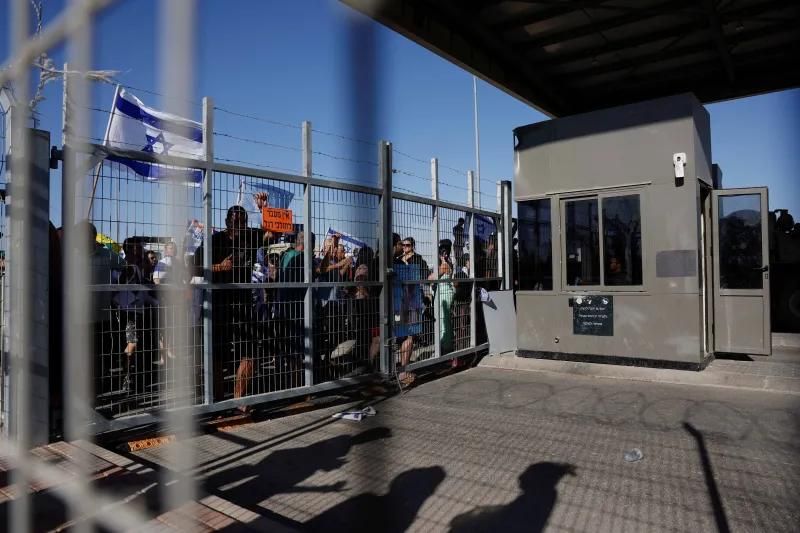
And so in the
decade after Netanyahu’s return to power,
an increasingly right-wing majority in the Knesset began advancing a slew of
illiberal laws aimed at eroding civil liberties and human rights and
entrenching the occupation. In 2011, the Knesset passed a law against political
boycotts; in 2014, it added a Basic Law requiring a referendum for Israel to
withdraw from any territory—including areas Israel had annexed in violation of
international law, such as East Jerusalem or the Golan Heights. The Knesset
also extended a 2002 law imposing bureaucratic hurdles on Palestinian spouses
of Israeli citizens, effectively threatening them with family separations that
most Jews would never encounter. It also passed laws targeting the foreign
funding of human rights groups documenting occupation-related violations of
Palestinian rights—seeking to tarnish them as foreign agents—and other
legislation aimed at encroaching on civil rights.
Knowing that citizens
would challenge these laws before the Supreme Court, right-wing leaders and
influential allies in the public sphere began to make direct rhetorical
assaults on the court itself. They accused it of advancing elite interests;
spreading secular, universalist values; and trampling the will of the people by
tying the hands of the elected right-wing government. The court was regularly
accused of privileging the rights of Palestinians over the interests of Israeli
security, even though its decisions upholding Palestinian rights were extremely
limited and it allowed the settlements and other occupation policies to go
forward. After becoming justice minister in 2015, Ayelet Shaked, a
member of the right-wing Jewish Home party, advocated a series of policies and
legislative efforts to weaken the judiciary, including giving the Knesset the
power to override Supreme Court rulings. The leader of her Jewish Home party
was Naftali Bennett, who, in the 2013 Knesset elections, campaigned on annexing
a large portion of the West Bank. Having served as prime minister briefly in
2021–22, Bennett is currently seen as one of the leading contenders to succeed
Netanyahu.
As Netanyahu
continued to win elections—in 2009, 2013, and 2015—Israel’s religious right
began to call more openly for annexation of the West Bank. In 2017, the Knesset
passed legislation legalizing unofficial West Bank outposts that even Israeli
law did not recognize. (All settlements are illegal under international law.)
The following year, the Knesset passed the “nation-state law,” a new Basic Law
defining Israel as a state in which Jews alone have the right to
self-determination and supporting Jewish settlements. The legislation created a
formal legal basis for discriminating against non-Jews and demoted the status
of the Arab language, which until then had been an official language in Israel.
Finally, in the course of 2019 and 2020, Netanyahu made public his plans to
gradually annex the West Bank, beginning with specific parts. The prime
minister and his political allies did not reveal what they intend to do about
the tens or even hundreds of thousands of Palestinians in those lands. If
Israel prevents Palestinians in annexed areas from gaining citizenship and
forces them to remain merely subjects without rights, it would be openly
embracing the status of an apartheid state.
The Supreme Court
struck down some of these efforts, including the law to legalize settlement
outposts, as well as several government attempts to formalize the military
exemption long claimed by large numbers of ultra-Orthodox Jews, a step aimed at
buying the Orthodox parties’ loyalty. The court rejected challenges to the 2018
nation-state law; nonetheless, leaders of Israel’s right-wing were incensed by
the court’s willingness to even entertain such challenges, and they continued
their attack on the judiciary.
By late 2019, Netanyahu’s political allies were
also seeking to fight his indictment on corruption charges, which led to the
opening of a trial against him in a Jerusalem district court the following
year. To do so, they needed to further delegitimize the proceedings and the
courts overall. They sought, furthermore, to weaken the powers of the attorney
general and appoint amenable Supreme Court justices, likely hoping they would
strike down relevant legal challenges to Netanyahu’s government—such as his
ability to serve under indictment—or rule favorably on future appeals in the
corruption case. (As of late September 2024, the trial was ongoing, and defense
testimonies, including by Netanyahu, are scheduled to begin in December.) By
June 2021, Netanyahu was out of power, having failed to secure a coalition
majority in repeated elections. Finally, in late 2022, Netanyahu was able to
engineer a return to power by allying with two ultra-Orthodox parties and two
ultranationalist, messianic right-wing parties that openly supported the full
annexation of the West Bank. Now, Netanyahu saw an opportunity to push through
some of the larger plans of the Israeli right and strengthen his grip on the
country.
Less Law, More Land
Launched in January
2023, the Netanyahu government’s plan to overhaul the judiciary was the
culmination of the Israeli right’s long attempts to remove democratic
constraints on its power. Among other changes, it aimed to gouge out judicial
review, engineer the selection of judges to ensure that courts would be
friendly to the ruling coalition’s ideology, and turn professional legal
ministerial advisers into political loyalists. The overarching goal was to make
sure that the government had as little institutional resistance as possible to
its efforts to crack down on Palestinian citizens, civil society, media
freedom, and the opposition; stifle left-wing, anti-occupation activism; and
advance annexation. Most courts would assess these deeply illiberal policies as
violating basic democratic principles.
The plan immediately
set off mass protests that quickly evolved into a titanic clash between the
government and a large segment of the Israeli population. The ruling coalition
insisted that it could not implement the voters’ will because of the decisions
of an unelected judiciary. But for the hundreds of thousands of Israelis who
took to the streets, Israel’s independent courts were the only things
protecting them from the government’s efforts to advance theocratic and Jewish
supremacist values, slash individual rights and freedoms, annex occupied
territories, and institutionalize corruption. The protests drew a very large
cross-section of society, including community and business leaders, doctors and
mental health professionals, workers in high-tech industries, scholars, and
teachers.
More critically,
groups of military reservists, on which the Israel Defense Forces relies to a
great extent, threatened that they would refuse to report for duty, sparking
deep concerns within the Israeli security establishment. Yoav Gallant,
Netanyahu’s defense minister, called on the government to pause the legislation
out of security concerns, and Netanyahu nearly dismissed him. But the
government pressed ahead, pushing through one key part of the reform in July
2023, as massive protests continued. By this point, Israelis had begun to
recognize how weak their country’s democracy was and were demanding stronger
foundations.
Israelis demonstrating against Netanyahu's judicial
plan, Tel Aviv, September 2023
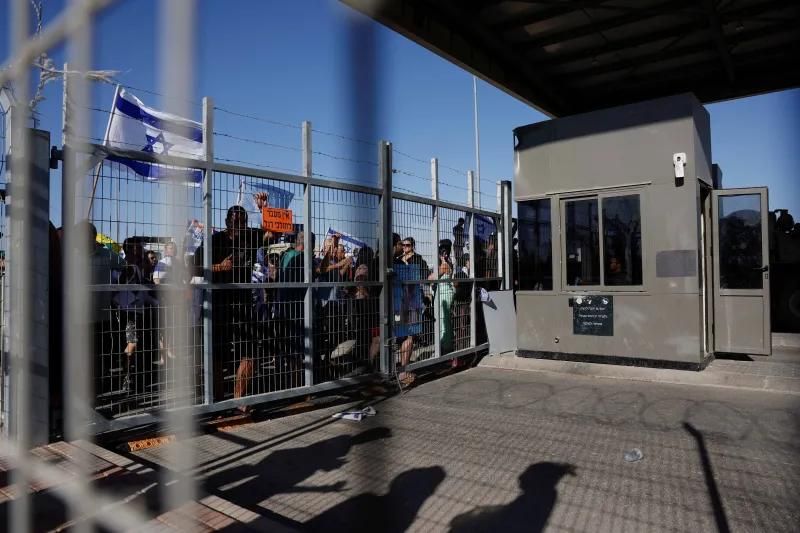
Yet the vast majority
of those taking part declined to protest the government’s plan to expand the
occupation and advance annexation of the West Bank; save for small clusters of
anti-occupation activists, protesters insisted that this was a separate issue
from the judicial takeover. They failed to see that Israel’s ambiguous
relationship with democratic values and rules, going back decades, had enabled
the occupation and the conflict all along, or that it was setting the stage for
a disastrous new war.
In the months after
Hamas’s October 7 attack, Netanyahu was given an opportunity. At first, the war
stopped the protest movement in its tracks, allowing the government to pursue
many of its antidemocratic plans with far less scrutiny. Overnight, groups that
had helped organize the democracy protests in 2023 shifted from criticizing the
government to distributing basic supplies—including cooked meals, clothing, and
toiletries—to those in need. The government, for its part, lagged badly in
providing these emergency services but wasted no time pushing through its
broader program of consolidating power by eroding civil liberties and
installing political loyalists in less-visible professional and technical
levels of government. Meanwhile, it ramped up its plans to annex occupied
territories, accelerating settlement expansion and virtually ceasing to enforce
the law against Israelis living in the occupied territories. Given free rein,
settlers in the West Bank became increasingly violent toward Palestinians, culminating
in several pogrom-like attacks on Palestinian villages.
For most Israelis,
the growing lawlessness in occupied areas is a secondary concern. Yet as the
war has ground on, many have become disillusioned by the government’s inability
to address their core concerns or even to ensure national security, and a large
majority now fear that the conflict in Gaza could spread to the West Bank. At
present, the sources of public discontent include the security and intelligence
failures that allowed the Hamas attack to happen, the failure to return Israeli
hostages from Gaza, and the failure to make clear how the war in Gaza will
end—although most Israeli Jews believe the war was eminently justified. Many
also blame the government for not securing Israel’s northern border with
Lebanon so that tens of thousands of displaced civilians can return, a
situation that has become all the more volatile since Israel’s dramatic
confrontation with Hezbollah began in September.
Moreover, a clear
majority of Israelis now believe the government’s behavior to be driven
primarily by Netanyahu’s personal stake in remaining in power. In a June 2024
survey by Israel’s N12 news channel, for example, 56 percent of respondents
agreed that Netanyahu’s reluctance to reach a hostage-release deal was driven
by political interests. A July poll by the same organization found that 54
percent of Israelis thought Netanyahu’s political considerations were behind
the continued fighting in Gaza; and a September N12 poll found that 63 percent
believed Netanyahu’s threat to replace his defense minister was driven by
political considerations rather than for the good of the state. Through much of
the first nine months of 2024, a majority of Israelis said they wanted the
government to accept a hostage deal, knowing this would entail a
cease-fire—steps that the government continually refused to take.
Anger at the
government has pushed Israelis back onto the streets for huge demonstrations.
Surveys regularly indicate that approximately 70 percent of Israelis want
Netanyahu to resign; his current coalition has failed to draw majority support
in any survey since early 2023, shortly after its inauguration. Many Israelis
are demanding new elections. In a poll in May, the Israeli Democracy Institute
found that just 29 percent of Israelis were optimistic about the future of
democratic rule in Israel, its lowest such finding ever; in August, the figure
inched up but remained at a still dismal 36 percent.
Israel’s democracy
crisis cannot be solved by elections alone. The war was ignited from Gaza, a
territory that is central to Israel’s strategy of occupation and its division
and control of Palestinians. For the sake of continuing and expanding that
control, the current government is willing to dismantle Israel’s independent
judiciary and further undermine the country’s institutions. By setting out to
claim full and exclusive Jewish sovereignty over all the land—including what
Netanyahu euphemistically refers to as an ongoing security presence in Gaza—the
government is seeking to impose a messianic, theocratic vision of territorial
expansion and to formally codify Jewish supremacy. Permanent military
occupation has become an inseparable part of the state itself.

Israel Reinvented
Amid one of the worst
regional crises in decades, prospects for democratic renewal in Israel may seem
more remote than ever. After all, for more than three-quarters of a century,
Israel has been unable to formally commit itself to key democratic principles,
even when it wasn’t involved in a dangerous multifront war. But the country’s
democratic institutions are under greater threat than at any previous moment in
history, and a growing number of Israelis seem to recognize this. Picking up
from the extraordinary 2023 protest movement, Israelis have an opportunity to
lay down fresh, and genuinely democratic, foundations when the war ends.
To start with, the
country needs fixed borders, a government that is committed to full democracy,
and a legal system that reflects both Jewish self-determination and true
commitment to equality for all citizens. And Israelis must finally adopt a full
bill of rights. Such a step is not a fantasy: the writers of a future
constitution can draw on numerous drafts of such a concept, painstakingly
developed by Israeli lawmakers and civil society figures over many decades but
never enacted. Most urgent are crucial rights that are still missing from
Israel’s Basic Laws, such as freedom of speech and expression, freedom of
religion, and due process. These universal rights must be formally legislated
for all Israeli citizens.
Protesters demanding an investigation of Israeli
failures leading to Hamas’s October 7 attack, southern Israel, July 2024
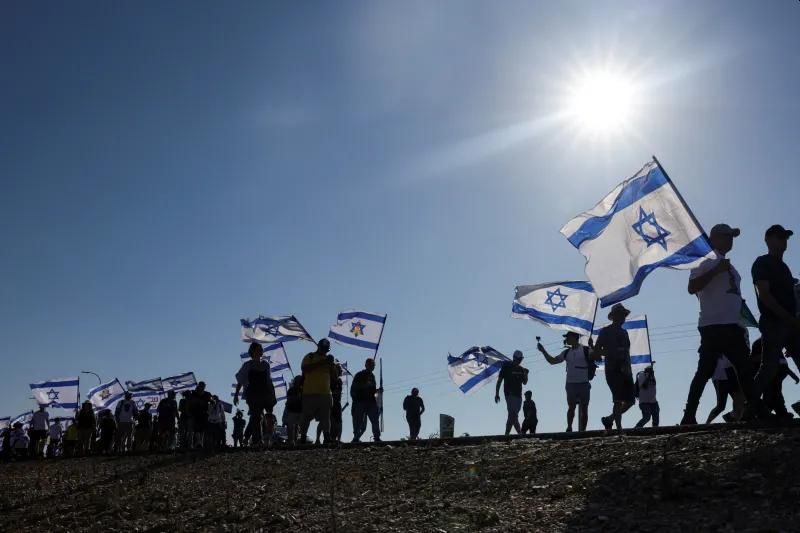
An Israeli
constitution must also face the sensitive task of addressing the collective identity
of Palestinian citizens, who constitute the country’s largest non-Jewish
minority. Numerous democratic nation-states, including North Macedonia,
Slovakia, and Spain, have constitutions that recognize ethnic or national
minorities within their citizenries and acknowledge their equality. Israel can
adopt collective minority rights—by way of cultural, linguistic, or even
national recognition—without forgoing the Jewish character of the state.
Indeed, the Jewish state must be compatible with universal democratic standards
to ensure civic equality between Jews and non-Jews—and to establish equality
between religious and secular Jews, as well.
Of course, building
these pillars in the immediate wake of a violent and prolonged conflict will be
extremely difficult. But as the examples of other war-riven societies have
shown, a constitutional process can itself provide crucial anchors for a more durable
peace. Indeed, for Israel, any serious constitutional effort must include
Palestinians—both those who are its own citizens and those who are now under
Israeli occupation. Effectively conceived, such a constitution-building effort
could thus spur a broader peace process based on Palestinians’
self-determination in a state of their own. Ultimately, the two states would
then define the border between them—ideally along the Green Line, and
preferably in a confederated arrangement that allows for freedom of movement
and residency, and in which residents remain citizens only of their
nation-state.
For now, any
large-scale constitutional process, let alone a two-state solution, may appear
far-fetched. But once a cease-fire is finally reached in Gaza or Lebanon, and
new Israeli elections are held, the horizon for change might look different,
even to Israel’s own leaders. After all, in 2023, hundreds of thousands of
Israelis recognized that the ills of the Netanyahu government could not be
addressed simply by toppling that government. Instead, they looked deeper, to
Israel’s roots. At demonstrations, they broadcast the recording of Ben-Gurion
reading the declaration of independence in 1948. Protesters chanted, “We won’t
stop until there’s a constitution.” Legal scholars offered public lectures and
circulated short, readable explanations of such concepts as judicial review,
the evolution and merits of Israel’s judicial-appointment system, and the
obscure “reasonability” grounds that the Supreme Court has used to review
executive action, particularly the political appointments of figures suspected
of corruption. The law passed in July 2023 would have limited the court’s
ability to do so, but the court struck down the law in January.
Another group of
scholars tried to revive long-defunct efforts to build a constituent assembly,
to establish a citizen-led process for adopting a constitution. At times during
the nine months of protests that lasted from January 2023 to the October 7 attack,
Israelis were asking themselves bigger questions about the foundations of their
country than at any time in recent memory—and they felt an urgency to find
answers.
The consequences of
not doing so could be dire. If Israel chooses to remain on its current path of
conquest and annexation and commits itself to opposing Palestinian statehood—as
Netanyahu repeatedly has done—it will consummate the destruction of Israel as a
democratic state. It will face the de facto incorporation of millions of
noncitizen Palestinians under Israeli rule; and in such a scenario, it would
never be able to recognize this huge population, because it would pose a threat
to Israel’s Jewish identity. (At present, an approximately equal number of Jews
and Palestinians—seven million each—live between the Jordan River and the
Mediterranean Sea.)
Such an outcome will
affect every Israeli citizen and subject. To avoid international isolation,
Israel will increasingly rely on authoritarian and nondemocratic states, and
nondemocratic forces within the United States. Israel will find it
difficult to retain the support of longtime democratic allies. Already,
numerous key Western partners have constrained weapons exports to Israel over
the past year, including Canada, the Netherlands, the United Kingdom, and
Italy—Israel’s third-largest arms supplier. The United States itself has
delayed shipments. If Israel no longer manifests the “shared values” that have
notionally bound it to the liberal democratic order, pressure on Western
governments to limit their aid to Israel will intensify.
After a decade in
which populism has surged all over the world, it has become clear how easy it
is for political leaders to undermine democratic norms in service of their
pursuits of power, especially during large-scale wars. Democracy must always be
defensive, but first, it must be built. Israel must end the war and start
building.
For updates click hompage here